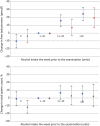Alcohol and male reproductive health: a cross-sectional study of 8344 healthy men from Europe and the USA
- PMID: 24893607
- PMCID: PMC4093992
- DOI: 10.1093/humrep/deu118
Alcohol and male reproductive health: a cross-sectional study of 8344 healthy men from Europe and the USA
Abstract
Study question: Is there an association between alcohol intake and semen quality and serum reproductive hormones among healthy men from the USA and Europe?
Summary answer: Moderate alcohol intake is not adversely associated with semen quality in healthy men, whereas it was associated with higher serum testosterone levels.
What is known already: High alcohol intake has been associated with a wide range of diseases. However, few studies have examined the correlation between alcohol and reproductive function and most have been conducted in selected populations of infertile men or have a small sample size and the results have been contradictory.
Study design, size, duration: A coordinated international cross-sectional study among 8344 healthy men. A total of 1872 fertile men aged 18-45 years (with pregnant partners) from four European cities and four US states, and 6472 young men (most with unknown fertility) aged 18-28 years from the general population in six European countries were recruited.
Participants/materials, setting, methods: The men were recruited using standardized protocols. A semen analysis was performed and men completed a questionnaire on health and lifestyle, including their intake of beer, wine and liquor during the week prior to their visit. Semen quality (semen volume, sperm concentration, percentage motile and morphologically normal sperm) and serum reproductive hormones (FSH, LH, testosterone, sex hormone-binding globulin, and inhibin B and free testosterone) were examined.
Main results and the role of chance: The participation rate for our populations was 20-30%. We found no consistent association between any semen variable and alcohol consumption, which was low/moderate in this group (median weekly intake 8 units), either for total consumption or consumption by type of alcohol. However, we found a linear association between total alcohol consumption and total or free testosterone in both groups of men. Young and fertile men who consumed >20 units of alcohol per week had, respectively, 24.6 pmol/l (95% confidence interval 16.3-32.9) and 19.7 pmol/l (7.1-32.2) higher free testosterone than men with a weekly intake between 1 and 10 units. Alcohol intake was not significantly associated with serum inhibin B, FSH or LH levels in either group of men. The study is the largest of its kind and has sufficient power to detect changes in semen quality and reproductive hormones.
Limitations, reasons for caution: The participation rate was low, but higher than in most previous semen quality studies. In addition, the study was cross-sectional and the men were asked to recall their alcohol intake in the previous week, which was used as a marker of intake up to 3 months before. If consumption in that week differed from the typical weekly intake and the intake 3 months earlier, misclassification of exposure may have occurred. However, the men were unaware of their semen quality when they responded to the questions about alcohol intake. Furthermore, we cannot exclude that our findings are due to unmeasured confounders, including diet, exercise, stress, occupation and risk-taking behavior.
Wider implications of the findings: Our study suggests that moderate alcohol intake is not adversely associated with semen quality in healthy men, whereas it was associated with higher serum testosterone levels which may be due to a changed metabolism of testosterone in the liver. Healthy men may therefore be advised that occasional moderate alcohol intake may not harm their reproductive health; we cannot address the risk of high alcohol consumption of longer duration or binge drinking on semen quality and male reproductive hormones.
Study funding/competing interests: All funding sources were non-profitable and sponsors of this study played no role in the study design, in data collection, analysis, or interpretation, or in the writing of the article. The authors have no conflicts of interest.
Keywords: alcohol; male fertility; reproductive hormones; semen quality.
© The Author 2014. Published by Oxford University Press on behalf of the European Society of Human Reproduction and Embryology. All rights reserved. For Permissions, please email: journals.permissions@oup.com.
Figures

Comment in
-
Re: Alcohol and male reproductive health: a cross-sectional study of 8344 healthy men from Europe and the USA.J Urol. 2015 Apr;193(4):1329. doi: 10.1016/j.juro.2014.12.045. Epub 2014 Dec 18. J Urol. 2015. PMID: 25890553 No abstract available.
References
-
- Allen NE, Appleby PN, Davey GK, Key TJ. Lifestyle and nutritional determinants of bioavailable androgens and related hormones in British men. Cancer Causes Control. 2002;13:353–363. - PubMed
-
- Anderson RA, Jr, Willis BR, Oswald C, Reddy JM, Beyler SA, Zaneveld LJ. Hormonal imbalance and alterations in testicular morphology induced by chronic ingestion of ethanol. Biochem Pharmacol. 1980;29:1409–1419. - PubMed
-
- Anderson RA, Jr, Willis BR, Oswald C, Zaneveld LJ. Ethanol-induced male infertility: impairment of spermatozoa. J Pharmacol Exp Ther. 1983;225:479–486. - PubMed
-
- Andersen AG, Jensen TK, Carlsen E, Jorgensen N, Andersson AM, Krarup T, et al. High frequency of sub-optimal semen quality in an unselected population of young men. Hum Reprod. 2000;15:366–372. - PubMed
-
- Brazil C, Swan SH, Drobnis EZ, Liu F, Wang C, Redmon JB, et al. Standardized methods for semen evaluation in a multicenter research study. J Androl. 2004a;25:635–644. - PubMed
Publication types
MeSH terms
Substances
Grants and funding
LinkOut - more resources
Full Text Sources
Other Literature Sources
Medical
Research Materials

